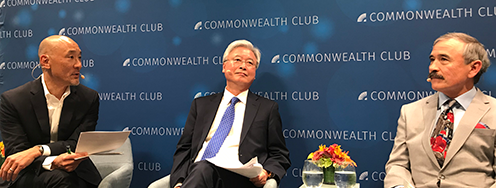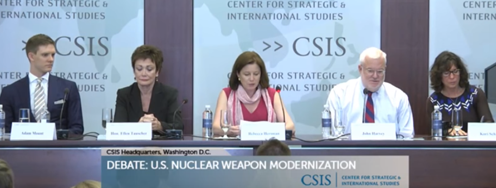Arms Control and The Kids
by Travis Sharp
Over at World Politics Review, friend-of-NOH Johan Bergenäs takes a look at youth involvement in arms control and nonproliferation. The article makes a nice companion piece to Adam Waxman’s article last year in WireTap.
The Kids come up frequently during conversations here at the office. Every time we discuss fundraising, online communications, or military outreach trips, we always ask “How can we reach out to young people?” This obsession with youth outreach is driven primarily by the simple reality that arms control’s political and financial supporters tend to be old. If we don’t want our profession to bleed to death right before our eyes, we must inspire and recruit a new generation of activists and scholars.
From personal experience, however, I can tell you that engagement with The Kids is very, very difficult. Let me explain.
True story: our Board of Directors reads in the dead tree New York Times that Facebook, YouTube, and Twitter are big things, right? So, like, let’s use those for youth outreach. Problem solved! Except that people don’t want to learn about nuclear weapons when they watch online videos. They want to watch stuff like this. And this. Probably not what our Board had in mind.
What should we do for outreach instead? In his article, Johan suggests both a college lecture tour by the Four Horsemen of the Anti-Apocalypse and increased recruitment of young people at arms control events. Those are great suggestions. I’ll add a third: job opportunities.
If you’re part of the rare breed coming out of college – aka interested in and vaguely familiar with security/nonproliferation/arms control – your options are extremely limited. You can shoot for the Carnegie Junior Fellows program, but good luck; it is ridiculously competitive and seems to prefer the nicely-pedigreed and internationalist set, which is kind of Carnegie’s MO in general. You can try for a Scoville Fellowship, which is how I got my start, but it’s the same problem: too many great people slip through the cracks because there simply isn’t enough money to fund all of the deserving candidates.
Going straight to grad school after undergrad is always an option. But then after grad school you must try to find a job when you posses limited professional work experience. In Washington, where paying entry-level jobs are scarce because there are so many people willing to work as unpaid interns, it’s tough to secure a gig with nothing but academic credentials.
This presents people with grad degrees (and a crushing amount of debt) who would really like to work in public service with a horrible choice: either take an unpaid internship or administrative position in public service, or go work for the dark side (defense contractor, Booz Allen Hamilton), pay off your school loans, and try to break into your preferred career later on.
Of course, working in the private sector changes your priorities (money!), so your good intentions may wither on the vine. Also, it is sometimes hard to move from the private sector to the public sector, particularly if you are a Democrat, because liberals prefer ascetic martyrs, not enterprising money-makers (aka Republicans).
Too few professional opportunities exist for young people in the arms control field. I can’t even tell you how many bright interns have come through our office desperately seeking a job in the field but have been forced to seek refuge outside of public service simply because they needed to pay the bills. If we are going to try and inspire The Kids in the ways Johan suggests, we should also create professional opportunities for The Kids once they become inspired.
Travis Sharp is communications director and military policy analyst at the Center for Arms Control and Non-Proliferation, a Ploughshares grantee.



